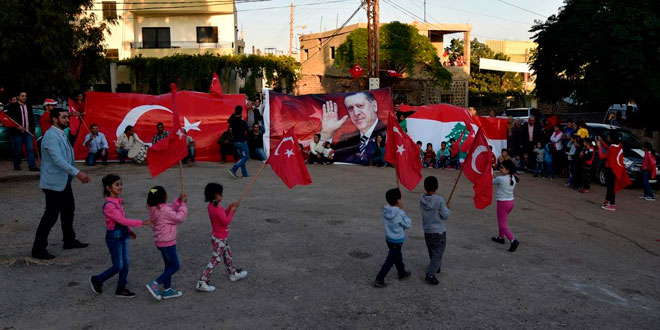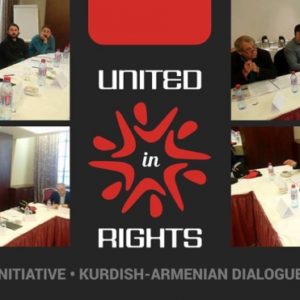It wasn’t until 1989 when a Lebanese soldier was overheard speaking Turkish words by his commander that Turkey found out about the existence of a Turkmen community in Lebanon. The soldier coming from the small village of Qawashra in Northern Lebanon and identified as Halit Esad is one of the Turkmen fading community living in Lebanon. Full of curiosity, Esad’s commander took the soldier to the Turkish embassy to meet the ambassador, thus the first contact between Turkey and the community was established.
The taking off of the relations was not at ease since Lebanon was in a state of civil war and Turkey was back then occupied by its many internal issues and trying to establish itself as a European country while giving its back to the Middle East. This policy have changed since the ascendency of the Justice and Development Party (AKP) to power in the early 2000’s and Ankara showed an increasing interest in the Lebanese Turkmen community and tried to strengthen and revive its Turkish identity.
According to an ethnographic field research titled “Turkey-Lebanon Friendship Bridge: The Turkish Presence and the Ottoman Heritage in Lebanon” published by the Center for Middle Eastern Strategic Studies (ORSAM) in 2015, around 15000 Turkmens live in Lebanon today. As many esteemed Lebanese historians have suggested, Turkmen tribes were brought by Mamluks to the region in order to collect taxes from Lebanese during the 14th century. When the Ottoman fought the Mamluks in the Battle of Marj Dabiq in 1516, the Turkmen supported the winning new rising Empire who awarded them with a wide area of influence and land in Lebanon and elsewhere in the Middle East.
Most of the Turkmens have progressively lost their sharp cultural and linguistic marker through a relentless process of Arabization. Additionally, the Lebanese ruling elite never recognized the Turkmen as a community or grant them any kind of political representation. The Lebanese regime is fully based on alliances and conflicts of sectarian communities, which leaves no room for ethnic communities like the Turkmen to express themselves freely, to fight for their ethnic rights or to be heard by others.
The Turkmen community is geographically dispersed in Lebanon; two villages in Akkar (Qawashra and Aydamun), two in Dinnieh (Hawwara and Jairoun) in the North Governorate and six small settlements (Duris, Sheymiye, Nananiye, Addus, Hadidiye and Mashari Al-Qaa) in the Beqaa Governorate eastern of Lebanon. Other Lebanese have Turkmen roots like the Cretan Turks who live in the city of Tripoli since 1898 and the Mardinian Turks living in Beirut since the 1940’s after they left southeastern Turkey due to economic reasons.
Whilst Turkmens living in Beirut and Tripoli have lost all their cultural and socioeconomic differences with the locals, others living in Akkar, Dinieh and Beqaa have a low socioeconomic level. Some of them never went to schools, others still live in tents and many can’t find jobs. The reason of this is the negligence of Lebanese governments to develop areas far from the capital and to the many social and economic problems that Lebanon already suffers.
The socioeconomic conditions of Turkmens started to improve recently even before the visit of Turkey’s then Prime Minister Recep Tayyip Erdogan to their villages in Akkar in 2010. During the past years the Turkish leadership showed a significant attention towards Lebanese Turkmens by teaching them Turkish language, granting them scholarships to study in Turkey, providing medical amenities, food and clothing, and building schools, hospitals, water wells, sports playgrounds, gardens, mosques and other sort of help. These aids and facilities were built by the Turkish embassy in Beirut or by Turkish organizations, such as the Yunus Emre Turkish Cultural Center in Beirut, and Lebanon Coordination Office of the Turkish Cooperation and Coordination Agency – TİKA, etc.

When the Ottoman Turks left Lebanon in 1914, the inhabitants of Qawashra – most of whom were of Turkish origin – decided to stay on.
It seems that Turkey have found a lost treasure in Lebanon and is now paying attention to it as a compensation for the past years. In return, the Turkmen community is benefiting from the Turkish attention to empower itself and improve its socioeconomic situation. The relation between the two works in favor of Turkey too since it is transforming its social, economic and cultural assistance to Lebanese Turkmens into a tool in order to achieve a political objective by finding a foothold in the Lebanese community and political arena.
In many occasions Lebanese Turkmens took the streets in order to protest an event in Turkey, celebrate a victory in favor of the AKP or to denounce the failed military coup in Ankara. A visit to the Turkmen villages can give an idea of the increasing correlation between the community and Turkey; many started to speak Turkish again, parents are giving Turkish names to newly born babies while photos of Erdogan and Turkish flags can be seen on almost every wall in every corner of the villages.
Despite the Turkish help, the Turkmen community still have many challenges to overcome. The lack of development on social, educational and infrastructural level in Akkar and the Beqaa is still posing a big challenge to the residents. Some efforts were made by individuals who took some initiatives to develop their villages on the cultural level by establishing local civil society organizations. There is a large number of associations working for Lebanese Turkmen and for boosting Turkey-Lebanon friendship. All these associations work to improve the conditions of Lebanese Turkmen, to preserve Turkmen culture and language, to develop Turkey-Lebanon relations, to increase social interaction between the two countries and to enhance Turkey’s image in Lebanon.
Additionally, thousands of Syrian refugees are living in every corner of Lebanon since 4 years and are starting to pose and increasing social, security and economic problem in Turkmen and other Lebanese villages. The absence of the government good services and presence adds another problem to the already poor conditions of small Turkmen villages; spread of corruption, defy the law, pursuit of favors from local politicians, lack of resources and poverty.
Joe Hammoura is a specialist in Middle Eastern and Turkish affairs and the co-founder of Leadership for Sustainable Development NGO. He is currently pursuing his Ph.D. in International Relations at Kocaeli University in Turkey. He holds a Masters degree in International Relations with Honors from the Holy Spirit University of Kaslik – Lebanon (2015). His work focuses on the internal Turkish policies, foreign affairs and its direct and indirect implications on the Middle East. Additionally, he writes for the Legal Agenda Magazine, and is a fellow researcher in Turkish Affairs in the Middle East Institute for Research and Strategic Studies (MEIRSS).







